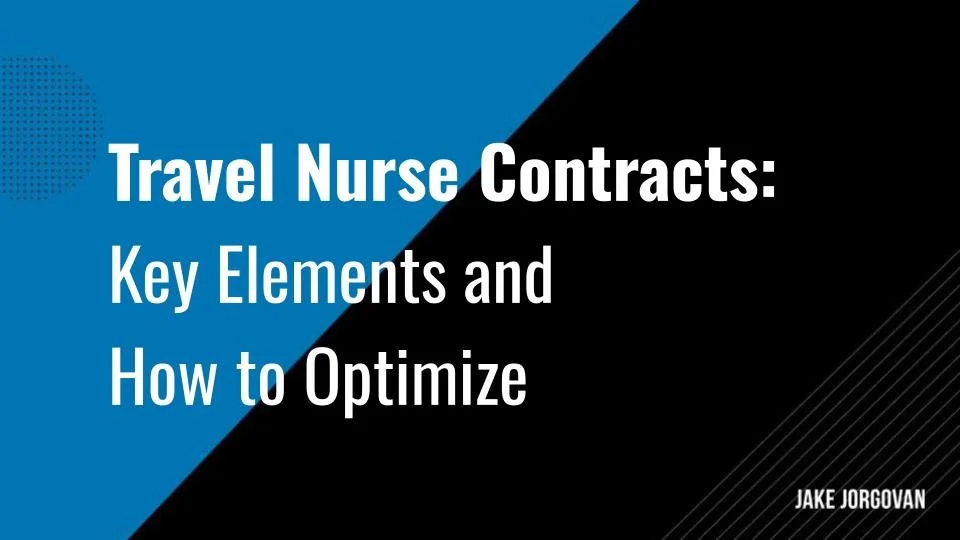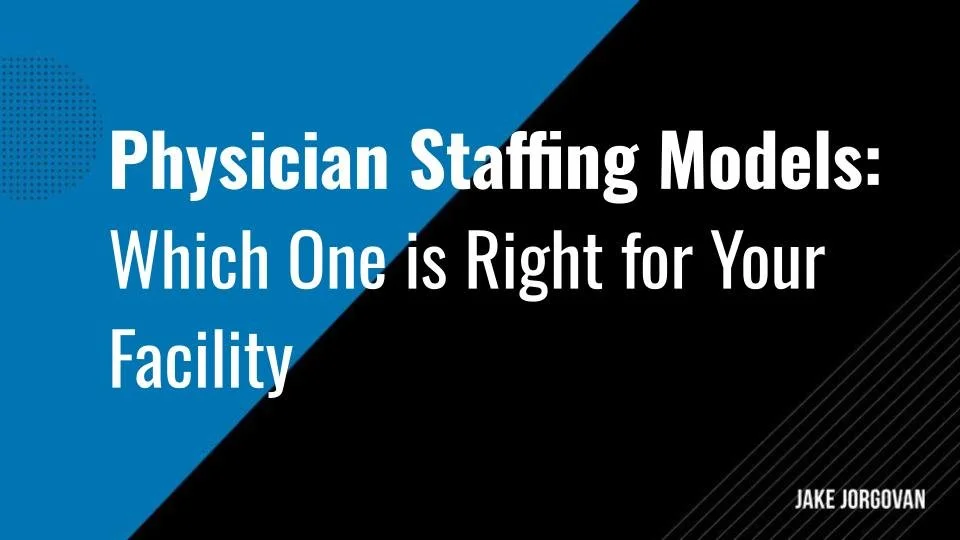Travel Nurse Contracts: Key Elements and How to Optimize
In the world of healthcare, securing top travel nurses is key. Travel nurse contracts play a vital role in attracting and retaining skilled professionals. The travel nursing industry has experienced significant growth, expanding by 430% between 2018 and 2024.
Key job details like assignment duration, pay rates, and benefits for travel nurses must be clearly defined. Optimizing these contracts helps you achieve mutual satisfaction and compliance.
This article dives into the essentials of travel nurse contracts for employers. We'll also explore strategies to make your contracts more appealing and effective.
Let’s get started.
Key Elements of Travel Nurse Contracts
It is crucial to include comprehensive and detailed elements in travel nurse contracts to ensure clarity and satisfaction. These key components protect both the nurse and the employer and also set clear expectations from the outset. Here are the essential elements every travel nurse job contract should encompass:
Assignment Details: Clearly define the hospital or facility, unit, and shift requirements. Specify start and end dates.
Compensation Packages: Include hourly rates, overtime rates, holiday rates, and on-call pay. Detail any bonuses, such as sign-on, completion, and referral bonuses. The graphic below shows typicaltravel nurse salaries by region:
Guaranteed Hours: State the minimum number of hours per week and outline any penalties for the facility if hours are not met. Travel nursing contracts vary in length but usually last about 13 weeks.
Housing Stipend: Provide details on assistance with housing options. Remember to include the stipend amount and type of housing arrangements.
Travel Reimbursement: Specify the amount for travel to and from the assignment. Include details on how and when this reimbursement is paid.
Licensing and Certification: Outline any required licenses and certifications. Include information on reimbursement for licensing fees.
Health Benefits: Detail health insurance, dental insurance, and vision insurance options. Include start date and coverage details.
Retirement Plans: Specify any available retirement savings plans. Include matching contributions if applicable, such as a 401k with company match.
Cancellation Policy: Clearly define the terms for canceling the contract. Include penalties for early termination by either party.
Extension Opportunities: Outline the process and terms for contract extensions. Specify any bonuses for an extension.
Floating Policy: State the requirements for floating to different units. Include any restrictions or additional compensation.
Compliance Requirements: List all necessary documentation and health screenings. Include deadlines for submission.
Payroll Schedule: Provide the payment frequency and method. Include details on how to address payroll discrepancies.
Onboarding Process: Detail the orientation and training schedule. Include any required pre-assignment testing, additional hours for education, or certifications.
Contact Information: Provide contact details for the agency and facility representatives. Include a 24/7 support line for emergencies.
Trends in Travel Nursing
Let’s explore a few of the main current trends in the world of travel nursing:
Increased demand for travel nurses – The ongoing nursing shortage and high patient volumes continue to drive demand, with hospitals relying on travel nurses to fill staffing gaps in their care teams. In fact, there were over 175,000 travel nurses in 2024, up from 33,000 in 2018.
Higher pay rates and incentives – Travel nurse salaries remain high, with some contracts offering crisis pay, sign-on bonuses, and retention incentives to attract skilled professionals. Travel nurses’ average salary is $102/ hour, but they can get over $160/ hour.
Focus on work-life balance – Many nurses prioritize travel jobs with flexible scheduling, mental health resources, and better work-life integration. That’s important because 12.5% of nurses have a severe work-life imbalance. However, a 2023 report indicated that burnout could reduce the number of travel nurses by as much as 9% in 2024, highlighting the need for better work-life integration.
Expansion of telehealth and remote nursing – Some travel nurses are finding roles in telehealth and remote patient monitoring and expanding their job options beyond traditional bedside care.
Stricter compliance and credentialing requirements – Facilities and staffing agencies are tightening credentialing processes, requiring nurses to maintain multiple state licenses and additional certifications. However, regulatory changes and licensing requirements continue to evolve. For example, in January 2024, Rhode Island joined the Nurse Licensure Compact (NLC), allowing travel nurses to work across state lines more efficiently.
These trends matter because they shape what travel nurses are looking for—and that should influence how healthcare facilities write their contracts. For example, if demand is high and nurses are earning upwards of $100 an hour elsewhere, offering below-market pay or rigid schedules isn’t going to cut it. Contracts that build in flexibility, options for mental health support, or even remote roles will stand out.
On the flip side, facilities also need to be realistic about things like stricter credentialing requirements or multi-state licensing. If you don’t factor those in, it can delay placements or lead to last-minute cancellations.
Understanding where the industry is headed—whether it’s burnout, pay expectations, or changes in telehealth—helps hospitals offer contracts that feel fair, up-to-date, and worth taking. That makes it easier to fill roles fast and keep care teams running smoothly.
That brings us to the next point:
How to Optimize Travel Nurse Contracts for Effective Recruitment
Here’s our advice to leverage your travel nurse contracts in the recruitment process:
1) Flexible Scheduling Options
Offering flexibility in scheduling for travel nurses significantly enhances their job satisfaction and loyalty to your agency. In fact, 73% of nurses and nursing students want this perk.
It accommodates their personal needs and helps balance work-life dynamics. Here’s how to implement flexible scheduling options effectively:
Assess Needs and Preferences: Conduct surveys or interviews with your travel nurses. Understand their preferred work hours and days off. Use this data to create schedules that accommodate their preferences whenever possible.
Offer Variable Shifts: Provide options for different shift lengths, such as 8-hour, 10-hour, or 12-hour shifts. Allow nurses to choose the shift patterns that best suit their lifestyles and personal commitments. Research indicates that offering a variety of shift lengths can help meet nurses' preferences and improve their work-life balance.
Implement Self-Scheduling: Use scheduling software that allows nurses to select their shifts from available options. This empowers nurses to have control over their schedules and increases their satisfaction.
Provide Shift Swapping: Enable a system where nurses can swap shifts with each other without management approval, as long as the minimum staffing requirements are met. This gives nurses flexibility in managing their personal and professional lives.
Ensure Adequate Staffing: Maintain a pool of backup nurses to cover sudden absences or changes in the schedule. This ensures that flexibility for one nurse does not lead to understaffing or overburdening others.
Monitor and Adjust: Review the scheduling system regularly and gather feedback from nurses. Make necessary adjustments to improve the system and address any concerns.
2) More Generous Housing Stipends
Increasing housing stipends can make your travel nurse contracts more attractive and give you a competitive edge in recruiting top talent. The image below shows how a housing stipend might fit into an overall travel nurse compensation plan:
Housing is a significant concern for travel nurses, and addressing it effectively can lead to higher satisfaction and retention rates. Here’s how to offer more generous housing stipends effectively:
To ensure travel nurses receive adequate dedicated housing support, start by analyzing market rates. Research housing costs in the areas where your nurses will be working and ensure stipends remain competitive. They should cover a range of accommodation options, from shared apartments to private rentals.
Providing flexible stipend options can further improve satisfaction. Offer different stipend levels based on the nurse’s housing preference—for example, a higher stipend for those choosing private housing and a lower one for shared accommodations.
Giving nurses a choice between a housing stipend and direct payment options can also be beneficial. Some may prefer receiving the stipend and handling their own arrangements, while others might opt for the agency to arrange housing directly, reducing logistical burdens.
To support your healthcare professionals beyond rent costs, include additional allowances for utilities, internet, and other essential services. This prevents nurses from covering these expenses out of pocket and ensures a smoother transition to their temporary assignments.
Finally, conduct regular reviews and adjustments to keep stipends aligned with market conditions. Housing costs fluctuate, so it's essential to monitor trends and update stipend amounts accordingly to stay competitive.
Insider Tip:
We suggest building partnerships with local real estate agencies and property managers. This secures better rates and more housing options for our nurses. Collaborating with local partners can also streamline the housing process and make it more efficient and less stressful for travel nurses.
3) Professional Development Opportunities
Professional development opportunities can be a major draw for travel nursing jobs, and can have many comprehensive benefits for nurses and healthcare facilities, as shown below:
Offering these opportunities benefits the nurses and also improves the quality of care they provide. Here’s how to incorporate professional development into your travel nurse contracts:
Identify Key Areas: Start by identifying the most valuable areas for professional development. Focus on high-demand specialties and certifications relevant to your facility’s needs.
Offer Continuing Education Units (CEUs): Provide access to CEU courses that are required for maintaining nursing licenses. Cover the costs and offer a variety of courses to suit different interests and travel nursing career paths.
Create Mentorship Programs: Pair travel nurses with experienced mentors in their specialty. This helps nurses integrate quickly into new environments and gain guidance on their travel nursing journeys.
Provide Access to Conferences and Workshops: Sponsor attendance at relevant nursing conferences and workshops. This exposure to the latest industry trends and networking opportunities is invaluable.
Implement Online Learning Platforms: Offer subscriptions to online learning platforms that provide a wide range of courses and resources. Make these platforms accessible from any location to fit their travel schedules.
Develop In-House Training: Organize regular in-house training sessions and workshops. Focus on new technologies, procedures, and best practices that align with your medical facility’s goals.
Insider Tip:
We recommend creating a structured professional development plan for each travel nurse at the start of their travel contract. This personalized plan should outline specific goals, available resources, and a timeline for achieving them. Regular check-ins to discuss progress and adjust the plan as needed can ensure that our nurses feel supported and motivated to advance their skills.
4) Streamlined Onboarding Processes
Streamlining the onboarding process for travel nurses significantly enhances their experience and improves operational efficiency. The graphic below shows some tips:
A smooth and efficient onboarding process ensures that nurses can start their travel assignments promptly and feel supported from day one. Here’s how to streamline the onboarding process effectively.
Pre-assignment preparation should begin well before their arrival by sending all necessary documentation and forms, including employment contracts, compliance forms, and any facility-specific requirements.
Clear communication is essential. Providing a detailed onboarding checklist with step-by-step instructions and key contact information helps nurses navigate the process efficiently. Digital onboarding platforms can further streamline this by allowing nurses to complete paperwork, training modules, and compliance requirements online before their start date. A study found that after implementing a digital onboarding app, 93% of incoming staff reviewed orientation materials before starting their role, a significant increase from the previous 13% engagement rate.
Orientation packets play a crucial role in familiarizing nurses with their new work environment. These should include facility maps, unit layouts, key contacts, and a schedule of any required in-person orientation sessions or meetings. To further ease the transition, a buddy system can be implemented, pairing new travel nurses with a current staff member or another travel nurse. This provides immediate support and a point of contact for questions.
Credential verification should be efficient and accurate. Implementing electronic verification services can reduce delays and ensure all certifications and credentials are processed without errors. There are some tools you can use, like Verified Credentials or e-Verify.
Lastly, establishing a feedback loop is essential for continuous improvement. Collecting input from nurses about their onboarding experience allows facilities to refine their processes and address any recurring challenges.
Insider Tip:
We suggest creating a dedicated onboarding coordinator role within our agency. This person can manage all aspects of the onboarding process, which ensures consistency and efficiency. They can also serve as a single point of contact for new nurses and address any issues that arise. This role significantly improves the onboarding experience and reduces the time it takes for nurses to become fully integrated into their new roles.
5) Performance-Based Incentives
Implementing performance-based incentives for travel nurses can significantly boost their motivation and productivity. These incentives align their efforts with your organization's goals and create a win-win scenario. Here’s how to integrate performance-based incentives into your travel nurse contracts:
Define Clear Metrics: Establish specific, measurable performance metrics. Focus on quality of care, patient satisfaction, and adherence to protocols. The graphic below shows some common nursing performance metrics:
Set Realistic Goals: Create attainable performance targets. Ensure they are challenging yet achievable within the contract period.
Offer Financial Bonuses: Provide monetary bonuses for meeting or exceeding performance targets. Structure these bonuses to reward exceptional performance without putting undue pressure on the nurses.
Non-Financial Rewards: Incorporate non-monetary incentives such as additional time off, professional development opportunities, or public recognition within the organization. 62% of nurses agree that even appreciation certificates increase their job satisfaction and performance.
Regular Performance Reviews: Schedule periodic performance reviews to assess progress toward goals. Use these reviews to provide feedback and adjust targets if necessary.
Transparent Communication: Clearly communicate the incentive structure at the start of the contract. Ensure nurses understand the criteria and the rewards associated with each performance level.
Insider Tip:
We recommend creating a performance dashboard accessible to both nurses and management. This dashboard can track real-time performance metrics, allow nurses to monitor their progress, and understand how close they are to achieving their incentives. This transparency motivates nurses and also helps management identify areas for support and improvement.
Common Mistakes with Travel Nursing Contracts
Travel nursing contracts can be complicated. Here are some common mistakes healthcare systems make and how you can avoid them.
Failing to Clearly Define Job Expectations – Some contracts lack specific details on unit assignments, shift expectations, or floating policies, which can lead to confusion and frustration. To avoid this, clearly outline all job responsibilities, required certifications, and any floating expectations before finalizing the contract.
Offering Non-Competitive Pay Rates and Benefits – In a high-demand market, facilities that fail to offer competitive pay packages, housing stipends, and medical benefits like life insurance, vision insurance, and health insurance will struggle to attract the best talent. Regularly benchmark compensation against industry standards and average pay rates for different experience levels and offer incentives like sign-on bonuses or completion bonuses to stay competitive.
Not Providing Sufficient Onboarding Support – Rushing the onboarding process can leave travel nurses unprepared and result in inefficiencies and errors. Implement a structured onboarding program, including orientation materials, facility tours, and access to a mentor or point of contact for support.
Inflexible Scheduling Policies – Facilities that do not offer some level of scheduling flexibility risk higher turnover rates among travel nurses. Allow for shift preferences when possible and implement self-scheduling or shift-swapping options to improve nurse retention and satisfaction.
By addressing these common mistakes, healthcare facilities can create a better experience for travel nurses, leading to improved retention, higher job satisfaction, and better patient care outcomes.
Offer Better Travel Nurse Contracts Today
Clear, fair contracts attract and retain top talent.
Focusing on key elements of the contract process can help employers ensure satisfaction and compliance, which in turn leads to better patient care and a more stable workforce.
Are your contracts helping or hindering your recruitment efforts?
Reflect on how you can improve and adapt.
Remember, a well-structured contract is a powerful tool. It shapes the success of both your staff and your organization.
So, start using the five strategies we discussed in this article to write travel nurse contracts that captivate the ideal candidates.
FAQ — Understanding Travel Nurse Contracts
How long are most travel nurse contracts?
Most travel nurse contracts last 13 weeks, though some can be as short as 8-week assignments or as long as 26 weeks, depending on facility needs and contract terms.
How do local travel nurse contracts work?
Local travel nurse contracts allow nurses to take short-term assignments within their home state or a nearby region, typically without receiving housing stipends since they do not relocate.
Why should you work with travel nurses?
Travel nurses help fill critical staffing gaps, bring diverse clinical experience, and allow healthcare facilities to maintain high-quality patient care without long-term hiring commitments.




































